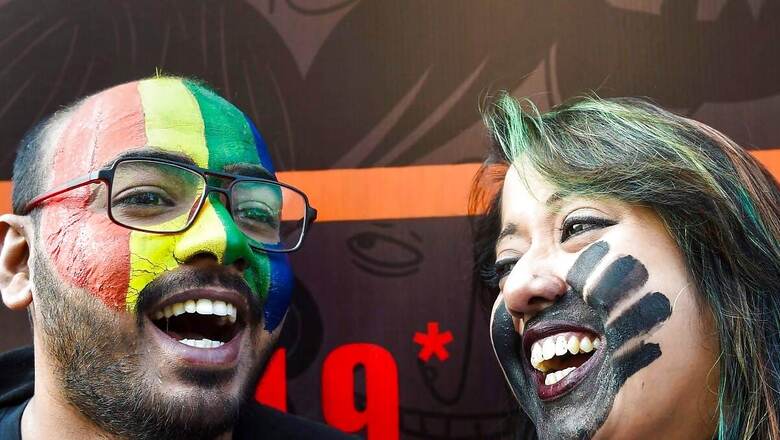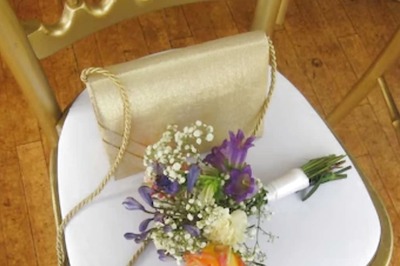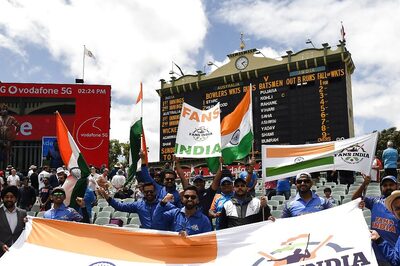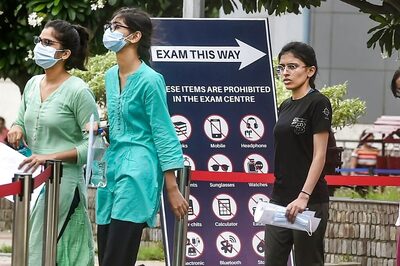
views
The Supreme Court of India on Tuesday began hearing arguments on a batch of petitions seeking legal validation of same-sex marriages in the country. The case is being heard by a five-judge Constitution bench comprising Chief Justice D Y Chandrachud and Justices S K Kaul, S R Bhat, Hima Kohli and P S Narasimha.
A bench headed by the CJI had taken note of the submissions of Solicitor General Tushar Mehta, who had mentioned the plea to decide the preliminary issue. CJI Chandrachud said the court will hear the Centre’s submission on that at a subsequent stage.
Same-Sex Marriage Hearing LIVE UPDATES
Appearing for petitioners, senior advocate Mukul Rohatgi said, “I will first establish that we have a fundamental right to get married and get it registered…then there come various rights that flow after getting married like getting pension, bank accounts etc.”
“I heard the submissions that we are not equal like heterosexuals. The State does not make two types of Citizens. We are all citizens of India. We became equal in 1950…
He said he is pained to read in newspapers that it’s a social and elitist concept.
“How was Lord Ayyapa born? It was a union of Lord Shiva and Lord Vishnu in the form of Mohini. When a Hindu widow remarriage was allowed even then society did not accept it. Sometimes Parliament acts with less alacrity or more alacrity… After Navtej, we have seen how people from our community are perceived. Stigma is still there… I cannot be told that wait for the Parliament to grant me these rights when I’m dead and gone. The choice of an individual is not an elitist concept.”
CJI said, “You say that the LGBT community has the right to marry, and at the same time, society cannot say we will deprive you of the benefit that conventional social relationships give. It is not enough to leave them alone it is essential to give them relevant social institutions.
Rohatgi said, “It is not good enough to say that we will leave you alone minus 377.”
CJI said, “We are social animals but for society to say that we will leave you alone but deny you the social relationships which are the basis of society that’s not acceptable.”
CJI asked the petitioner’s counsel that, if the Supreme Court declares that people belonging to queer community have a right to marry, what is the next step?
“Are you saying that Special Marriage Act already recognises that right in it?” he asked.
Appearing for petitioners, senior advocate Mukul Rohatgi said that provisions of the Special Marriage Act were made 70 years ago, and there have been evolutions- live in etc have come in.
“I want to say that your lordships may broadly read “spouse” in place of “man and woman” or “husband and wife”,” he said.
He further argued that the concept of marriage has changed over the last 100 years. “Earlier we had child marriages, temporary marriages, a person could marry any number of times – that also changed,” he said.
“If we have the same rights as heterosexual groups, we have the same right to marry too…The legislative drafting which was done 50-70 years ago cannot stop what I’m constitutionally entitled to get,” Rohatgi added.
Hearing the argument, CJI Chandrachud said that at this stage, “we can steer clear of personal law” and changes in SMA is “one possible option”. However, he added, “we can’t deny the fact that there is undoubtedly the legislative element also involved.”
Appearing for the state, Solicitor General Mehta told that there is no legal lacuna in the Transgender Persons (Protection of Rights) Act and the question is not of granting a socio-legal sanction.
He apprised the court that it has been clarified that none will discriminate against transgender persons. “There are provisions of reservation for transgender,” he adds.
He further reiterates to first take up the Centre’s plea raising preliminary objection on the petition seeking recognition of same-sex marriage.
“We are misdirecting the question. It’s not about protection or privacy or equality of the LGBTQ but the right of conferment of a socio-legal status and whether that can be done by judicial legislation,” Mehta said.
Solicitor General argued that even if the Supreme Court does not go into personal laws, the window could again open in the future.
Mehta further argued that societal acceptance of any relationship is never dependent on either legislation or judgement. “The legislative intent of the legislature throughout has been a relationship between a biological man and a biological female”, he said.
To this, CJI noted that no such thing as an absolute concept of biological man and woman.
However, Mehta insisted that it was indeed a question of one’s genitals, whereby a man would mean a “biological man” only.
The hearing and the consequential outcome will have significant ramifications for the country where common people and political parties hold divergent views on the subject.
SC To Hear Centre’s Objection to Court Deciding Same-Sex Marriage Legality
The apex court will also hear the Centre’s plea questioning the maintainability of these petitions seeking to legalise same-sex matrimony, which it termed as a very sensitive socio-legal issue that fell under Parliament’s exclusive law-making powers
The Centre on Monday said the petitions seeking legal validation of same-sex marriage reflects an ”urban elitist” view for the purpose of social acceptance. The government told the top court that recognition of marriage is essentially a legislative function which the courts should refrain from deciding.
It also asserted that legal validation for same-sex marriages will cause complete havoc with the delicate balance of personal laws and accepted societal values.
A bench headed by Chief Justice DY Chandrachud took note of the submissions made by Solicitor General Tushar Mehta, who mentioned the plea to decide a preliminary issue. The CJI said the bench also comprising justices PS Narasimha and JB Pardiwala will hear the matter today.
ALSO READ: ‘Urban Elitist Concept’: Centre Cites Islamic, Hindu Law To Opposes Legal Recognition of Same-Sex Marriages in SC
SC’s View On The Issue Of Same Sex Marriage
While referring the pleas to the constitution bench, the court had said the submissions on the issue involve an interplay between constitutional rights on the one hand and special legislative enactments, including the Special Marriage Act, on the other.
“Having due regard to the broader context of the petitions before this court, the inter-relationship between the statutory regime and constitutional rights, we are of the considered view that it would be appropriate if the issues raised are resolved by a constitution bench of five judges of this court…,” the bench had said while referring to Article 145 (3) of the Constitution and calling it a “very seminal issue”.
“We accordingly direct that the hearing of these petitions be placed before a constitution bench,” the apex court said while posting the pleas for hearing on April 18.
Article 145(3) of the Constitution says there should be at least five judges to hear cases that involve a substantial question of law as to the interpretation of the Constitution, or any reference under Article 143, which deals with the power of the President of India to consult the Supreme Court.
The court said in the batch of pleas, the petitioners have sought recognition of the rights of couples of the same gender to marry, and while relying upon the apex court verdicts on right to privacy and decriminalising section 377 of the Indian Penal Code, they have asserted broader constitutional entitlements arising out of the right to life and personal liberty, right to dignity and others.
The bench had said one of the issues raised before it also relates to the rights of transgender couples to marry.
Solicitor General Tushar Mehta had told the bench that marriage is not just a contract in the case of Hindu law which it is in Mohammedan law.
“When the question of granting recognition, legal sanction to a relationship is concerned, that is essentially a function of the legislature and for more than one reason,” he said.
The apex court had, on January 6, clubbed and transferred to itself all such petitions pending before different high courts, including the Delhi High Court.
On December 14 last year, the top court had sought the Centre’s response to two pleas seeking a transfer of the petitions pending in the Delhi High Court for directions to recognise same-sex marriages to itself.
Prior to that, on November 25 last year, the apex court had sought the Centre’s response to separate pleas moved by two gay couples seeking enforcement of their right to marry and a direction to the authorities concerned to register their marriages under the Special Marriage Act.
A bench headed by CJI Chandrachud, who was also part of the Constitution bench that in 2018 decriminalised consensual gay sex, issued a notice to the Centre in November last year, besides seeking Attorney General R Venkataramani’s assistance in dealing with the pleas.
The top court’s five-judge Constitution bench, in a path-breaking unanimous verdict delivered on September 6, 2018, held that consensual sex among adult homosexuals or heterosexuals in private space is not a crime while striking down a part of the British-era penal law that criminalised it on the ground that it violated the constitutional right to equality and dignity.
Read all the Latest India News here


















Comments
0 comment